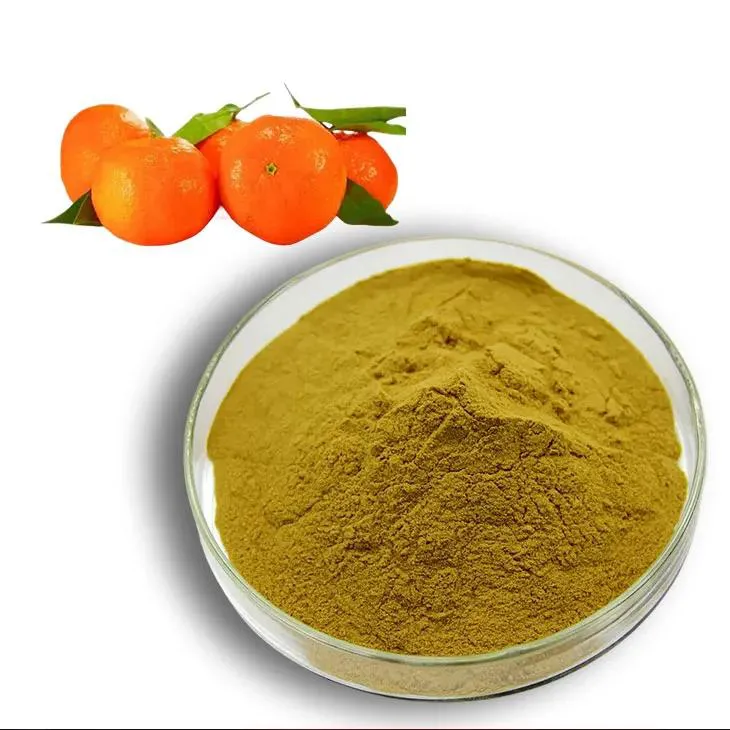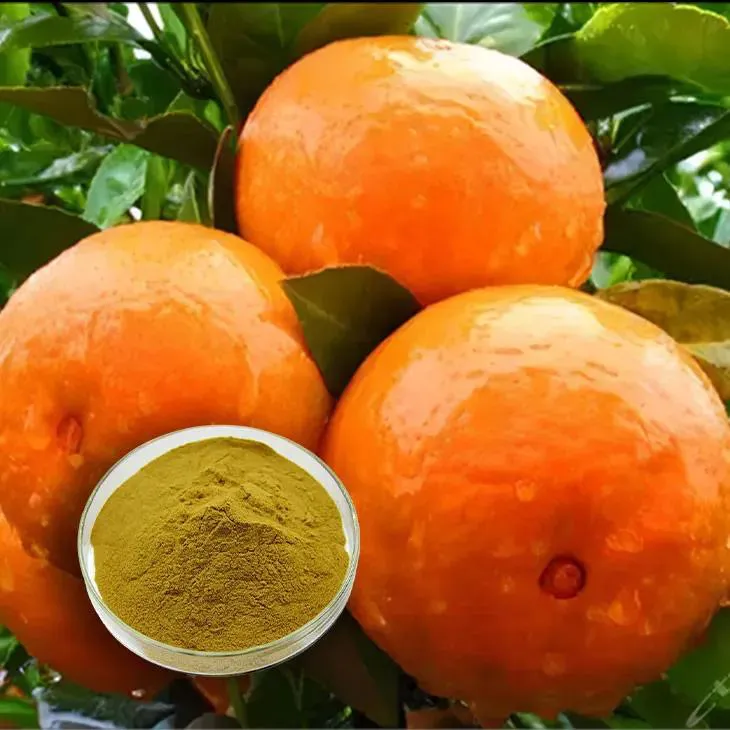- 0086-571-85302990
- sales@greenskybio.com
Certified organic citrus bioflavonoids
2024-12-02

1. Introduction to Organic Citrus bioflavonoids
Organic Citrus bioflavonoids are a remarkable class of compounds that have been garnering increasing attention in recent years. Bioflavonoids are a group of plant - based substances that are widely distributed in nature, and those derived from citrus fruits are particularly rich in variety and functionality. These compounds are typically found in the peel, pulp, and membranes of citrus fruits such as oranges, lemons, and grapefruits.
The fact that they are "certified organic" adds another layer of significance. Organic certification ensures that these bioflavonoids are sourced from citrus fruits that have been grown without the use of synthetic pesticides, fertilizers, or genetically modified organisms (GMOs). This not only benefits human health but also has positive implications for the environment.

2. The Agricultural Aspect: Sustainable Farming
2.1. Organic Farming Practices for Citrus
The cultivation of organic citrus fruits for bioflavonoid extraction promotes sustainable farming practices. Organic farmers rely on natural methods to maintain soil fertility, control pests, and manage diseases. For example, instead of using chemical fertilizers, they might use compost and manure to enrich the soil. This helps to build a healthy soil ecosystem, which in turn supports the growth of healthy citrus trees.
2.2. Environmental Benefits
- Reduced Chemical Pollution: By avoiding the use of synthetic pesticides and fertilizers, organic citrus farming reduces chemical runoff into waterways. This helps to protect aquatic ecosystems and the organisms that depend on them. - Biodiversity Conservation: Organic farms often support greater biodiversity. They provide habitats for a variety of insects, birds, and other wildlife. For instance, hedgerows and wildflower areas on organic citrus farms can attract beneficial insects like bees, which are important for pollination. - Soil Health: Organic farming practices improve soil structure and fertility over time. The use of cover crops, for example, helps to prevent soil erosion and adds organic matter to the soil.
3. Human Physiology: How Organic Citrus bioflavonoids Interact with the Body
3.1. Enhancing Cell Membrane Integrity
One of the key ways in which organic citrus bioflavonoids interact with the body's cells is by enhancing cell membrane integrity. The cell membrane is a crucial component of cells, as it controls what enters and leaves the cell. Bioflavonoids can help to strengthen the cell membrane by interacting with its lipid components. This can have a range of positive effects on cell function, including improved nutrient uptake and better protection against harmful substances.
3.2. Antioxidant Activity
- Free Radical Scavenging: Organic citrus bioflavonoids possess antioxidant properties. They can scavenge free radicals in the body, which are unstable molecules that can cause damage to cells and DNA. By neutralizing these free radicals, bioflavonoids help to reduce the risk of various diseases, such as cancer, heart disease, and neurodegenerative disorders. - Cellular Protection: Antioxidants like bioflavonoids also protect cells from oxidative stress. Oxidative stress occurs when there is an imbalance between the production of free radicals and the body's ability to detoxify them. By reducing oxidative stress, bioflavonoids support overall cellular health.
3.3. Anti - Inflammatory Effects
- Inflammation Modulation: Organic citrus bioflavonoids have been shown to have anti - inflammatory effects. They can modulate the body's inflammatory response by interacting with immune cells and signaling molecules. This is beneficial in conditions where chronic inflammation is a factor, such as arthritis, inflammatory bowel disease, and asthma. - Reducing Inflammatory Markers: In some studies, bioflavonoids have been found to reduce the levels of inflammatory markers in the blood, such as C - reactive protein. This further supports their role in managing inflammation in the body.
4. The Supplement Market: Organic Citrus Bioflavonoids as a Natural Alternative
4.1. Consumer Demand for Organic Supplements
In the supplement market, organic citrus bioflavonoids are becoming increasingly popular as a natural alternative to synthetic health products. Consumers are becoming more conscious about what they put into their bodies and are seeking products that are pure and effective. The organic certification associated with these bioflavonoids gives consumers confidence in their quality and safety.
4.2. Comparison with Synthetic Supplements
- Purity: Organic citrus bioflavonoid supplements are often considered purer than their synthetic counterparts. Since they are sourced from natural citrus fruits, they contain a complex mixture of bioflavonoids and other beneficial compounds that work together synergistically. In contrast, synthetic supplements may only contain isolated forms of bioflavonoids or other substances. - Efficacy: Many consumers believe that natural bioflavonoids are more effective in promoting health. While scientific research on the relative efficacy of natural vs. synthetic bioflavonoids is ongoing, some studies suggest that the natural form may be better absorbed and utilized by the body. - Safety: Organic supplements are generally perceived as safer, as they are less likely to contain contaminants or additives that may be present in synthetic products.
4.3. Product Forms and Availability
- Capsules and Tablets: Organic citrus bioflavonoid supplements are commonly available in capsule or tablet form. These are convenient for consumers to take and can be easily incorporated into their daily routine. - Powders: Bioflavonoid powders are also available, which can be added to smoothies, juices, or other beverages. This allows for more flexibility in consumption, especially for those who prefer not to take pills. - Tinctures: Some products are available as tinctures, which are liquid extracts. Tinctures may be absorbed more quickly by the body and can be a good option for those who have difficulty swallowing pills.5. Incorporating Organic Citrus Bioflavonoids into Your Diet
5.1. Consuming Citrus Fruits Directly
One of the simplest ways to obtain organic citrus bioflavonoids is by consuming citrus fruits directly. Eating an orange, lemon, or grapefruit as part of your daily diet can provide a natural source of these beneficial compounds. The whole fruit, including the peel (where applicable) and pulp, contains bioflavonoids. However, it's important to note that some citrus fruits may be treated with pesticides, so choosing organic varieties is recommended for maximum health benefits.
5.2. Juices and Beverages
- Fresh - Squeezed Juices: Fresh - squeezed citrus juices are another great way to get bioflavonoids. These juices retain much of the bioflavonoid content of the fruit, although some may be lost during the juicing process. It's best to drink freshly squeezed juices immediately to preserve their nutritional value. - Fortified Beverages: Some commercial beverages are fortified with citrus bioflavonoids. These can be a convenient option for those who don't have access to fresh citrus fruits or juices. However, it's important to check the label to ensure that the product contains high - quality, organic bioflavonoids.
5.3. Culinary Uses
Citrus fruits can also be used in cooking to add flavor and nutrition. For example, lemon zest can be added to baked goods, salads, or marinades. The zest contains a high concentration of bioflavonoids, so using it in cooking is a creative way to incorporate these compounds into your diet. Orange segments can be added to fruit salads or used as a topping for yogurt, providing both taste and bioflavonoid benefits.6. Research and Future Perspectives
6.1. Current Research on Organic Citrus Bioflavonoids
There is ongoing research into the health benefits of organic citrus bioflavonoids. Scientists are exploring their potential in treating and preventing a wide range of diseases, from cancer to cardiovascular diseases. For example, some studies are investigating how bioflavonoids can modulate gene expression to prevent the development of cancer cells. Other research is focused on their role in improving endothelial function in the blood vessels, which is important for heart health.
6.2. Future Directions
- New Formulations: In the future, we can expect to see new formulations of organic citrus bioflavonoid supplements. These may include combinations with other beneficial compounds to enhance their efficacy. For example, bioflavonoids could be combined with probiotics or other antioxidants to create more comprehensive health products. - Targeted Therapies: Research may lead to the development of targeted therapies using organic citrus bioflavonoids. For instance, they could be used to develop drugs or treatments for specific diseases or conditions, such as autoimmune disorders. - Expanded Agricultural Research: There will also be a need for more research in the agricultural aspect of organic citrus cultivation. This could include finding new ways to improve yields while maintaining the integrity of the organic certification and maximizing the bioflavonoid content of the fruits.7. Conclusion
Certified organic citrus bioflavonoids are a multifaceted wellness booster with significant implications in agriculture, human physiology, and the supplement market. Their role in promoting sustainable farming, interacting with the body's cells in beneficial ways, and serving as a natural alternative in the supplement market makes them an important area of study and consumption. As research continues to unfold, we can expect to see even more applications and benefits of these remarkable compounds in the future. Whether consumed through whole fruits, juices, supplements, or used in cooking, organic citrus bioflavonoids offer a natural and potentially powerful way to enhance our well - being.
FAQ:
What are certified organic citrus bioflavonoids?
Certified organic citrus bioflavonoids are natural compounds found in citrus fruits. They are derived from organically grown citrus and have various health - promoting properties. Organic certification ensures that they are produced following strict environmental and quality standards.
How do organic citrus bioflavonoids benefit human health?
They benefit human health in multiple ways. For example, they enhance cell membrane integrity, which can help cells function better. They also act as antioxidants, protecting the body from harmful free radicals, and may contribute to overall well - being.
What is the ecological significance of organic citrus bioflavonoids?
Their ecological significance lies in the fact that they come from organically cultivated citrus. Organic farming practices used to grow these citrus fruits are more sustainable. This includes reduced use of synthetic pesticides and fertilizers, which is better for the environment, soil health, and biodiversity.
Why are they becoming popular in the supplement market?
They are becoming popular in the supplement market because consumers are increasingly seeking natural alternatives to synthetic health products. The organic certification gives them an added appeal as it is associated with purity and higher efficacy.
How are organic citrus bioflavonoids extracted?
Typically, they are extracted from citrus fruits through various methods such as solvent extraction or mechanical pressing. However, in the case of organic bioflavonoids, the extraction process must also adhere to organic standards to maintain the integrity of the product.
Related literature
- The Role of Bioflavonoids in Citrus Fruits and Their Health Benefits"
- "Organic Farming and the Production of Bioflavonoid - Rich Citrus"
- "Certification Standards for Organic Citrus Bioflavonoid Supplements"
- ▶ Hesperidin
- ▶ citrus bioflavonoids
- ▶ plant extract
- ▶ lycopene
- ▶ Diosmin
- ▶ Grape seed extract
- ▶ Sea buckthorn Juice Powder
- ▶ Beetroot powder
- ▶ Hops Extract
- ▶ Artichoke Extract
- ▶ Reishi mushroom extract
- ▶ Astaxanthin
- ▶ Green Tea Extract
- ▶ Curcumin Extract
- ▶ Horse Chestnut Extract
- ▶ Other Problems
- ▶ Boswellia Serrata Extract
- ▶ Resveratrol Extract
- ▶ Marigold Extract
- ▶ Grape Leaf Extract
- ▶ blog3
- ▶ blog4
-
The best lemon juice powder in nature.
2024-12-02
-
Organic Vitamin K2 Powder Suppliers
2024-12-02
-
Bulk purchase of L - tyrosine.
2024-12-02
-
Vitamin K2 Manufacturers
2024-12-02
-
100% Pure Natural Rutin.
2024-12-02
-
Chinese Citrus Bioflavonoid Suppliers.
2024-12-02
-
Shikonin
2024-12-02
-
Mangosteen extract powder
2024-12-02
-
Cassia Seed Extract
2024-12-02
-
Clove Powder
2024-12-02
-
Green coffee bean Extract
2024-12-02
-
Calendula Extract
2024-12-02
-
Saponin Extract
2024-12-02
-
Golden Seal Extract
2024-12-02
-
Fig Extract
2024-12-02
-
Nettle Root Extract
2024-12-02





















